Summer 2015
Nowhere to Turn: a Nepali Cab Driver in Qatar
– J. Zach Hollo
Sarun, a cab driver in Qatar, had not been paid in nearly four months. His family back home in Nepal desperately needed the money. He hadn't been home in two years, and his boss controlled his passport. All Sarun could do was wait.
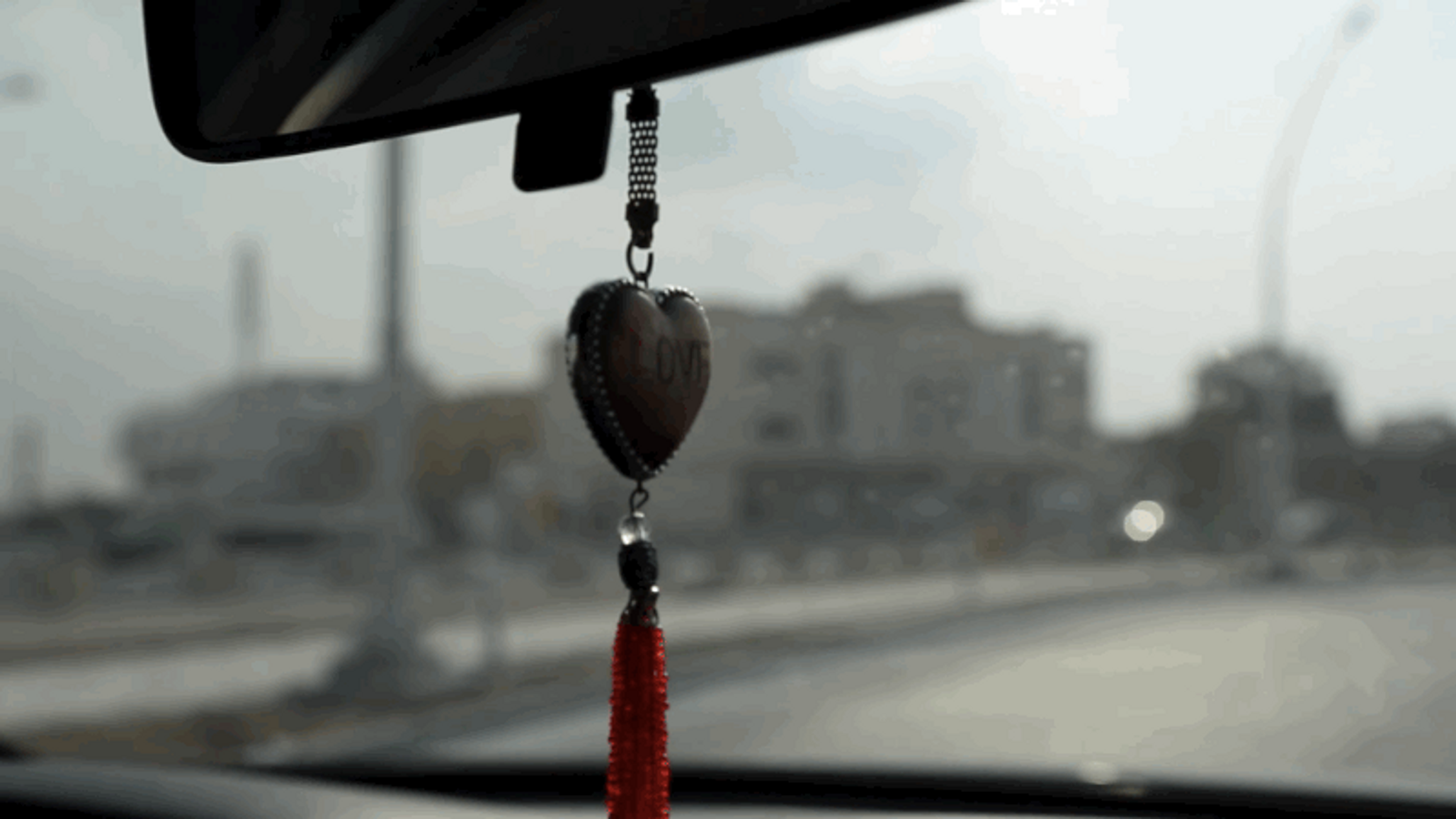
October 12, 2014
The Doha sun beat down on the white Honda Civic that Sarun Chhetri drives for Al Afdhal Transport Company. The 24-year-old had just shuttled several kids home from school. At half past three, it was 95 degrees Fahrenheit, and sporadic winds scattered sand and loose garbage along the road. The car was an air-conditioned refuge. As he drifted along with the afternoon traffic, Sarun fiddled with the radio until he landed on a station with Hindi music. His phone rang. It was his 49-year-old mother, Sita. She got straight to the point.
“Our home is flooded with water. It’s been raining,” Sita said. She lives with Radhika, Sarun’s 23-year-old wife, and Saksham, their three-year-old son, in a Nepali village outside of Lumbini. It’s about a nine-hour drive from Kathmandu, but thousands of miles from Doha, Qatar, where Sarun works. Their small house, which consists of two bedrooms and a kitchen, is covered by a dilapidated wooden roof that leaks in several places. Sita had repeatedly raised the subject before, but this time she was adamant.
“We need a new roof. If you don’t send any money home, I’m going to the bank,” she said. “I’ll take out 400,000 rupees [around $4,000]. And you can pay it back once you’re paid.”
Sarun had not been paid in nearly four months. He had worked at Al Afdhal for three years, long enough to earn a raise from his starting pay of $245 to $330 a month. With overtime, he could make $410. The company gave him a place to live but no food, so he kept about $80 for meals and sent the remaining $330 home, where it went to pay for food, utilities, and Saksham’s school tuition. It helped that Sita received a pension of $137 every month from her deceased husband’s former employer, but $110 of that went to monthly house payments.
The 25th of each month was supposed to be payday. But on July 25, Sarun received nothing. His boss offered no explanation, but said, “Don’t worry. It will come.” Day after day, Sarun went to work hoping for a late payday that never materialized. On August 25, the following payday, he again got nothing.
Reporting his boss to the authorities was not an option. Sarun had no legal backing. After his original one-year contract expired, he stayed with the company. But since he had never formally signed a new contract, there was no proof that the company owed him anything.
In February 2015, the Qatari government approved an amendment to its labor laws that would require businesses to pay employees via bank deposits, which the government could monitor electronically. This would make it impossible for companies like Al Afdhal to deny payment to its employees without the authorities knowing about it. The amendment grants businesses a six-month grace period, and Al Afdhal has still not changed its method of cash payments.
It stopped short of addressing other labor concerns, such as the kafala system of employment sponsorship, which requires employer consent for workers to leave the country or change jobs. Nor did the amendment address the necessity of contracts, which would make it harder for companies to keep employees like Sarun in legal limbo. In May 2014, the Qatari government announced plans to address these wider issues, but in October, any relevant legislation was still working its way through Qatar’s legislative Shura council.
Other drivers also faced nonpayment at Al Afdhal. Conversations with multiple employees suggested that the company will reliably pay some drivers their monthly salary on time while neglecting to pay others. In following months, Al Afdhal often partially reimbursed drivers who had not been paid in several months, but cut off payment to drivers who had been receiving their monthly payments, and so on. This cycle seems to minimize the number of disgruntled employees at any given time. Al Afdhal drivers did discuss striking and organizing demonstrations. In the end, they stopped short for fear of retaliation.
Sarun was alone. He did the only thing he could think to do: he waited and kept working.
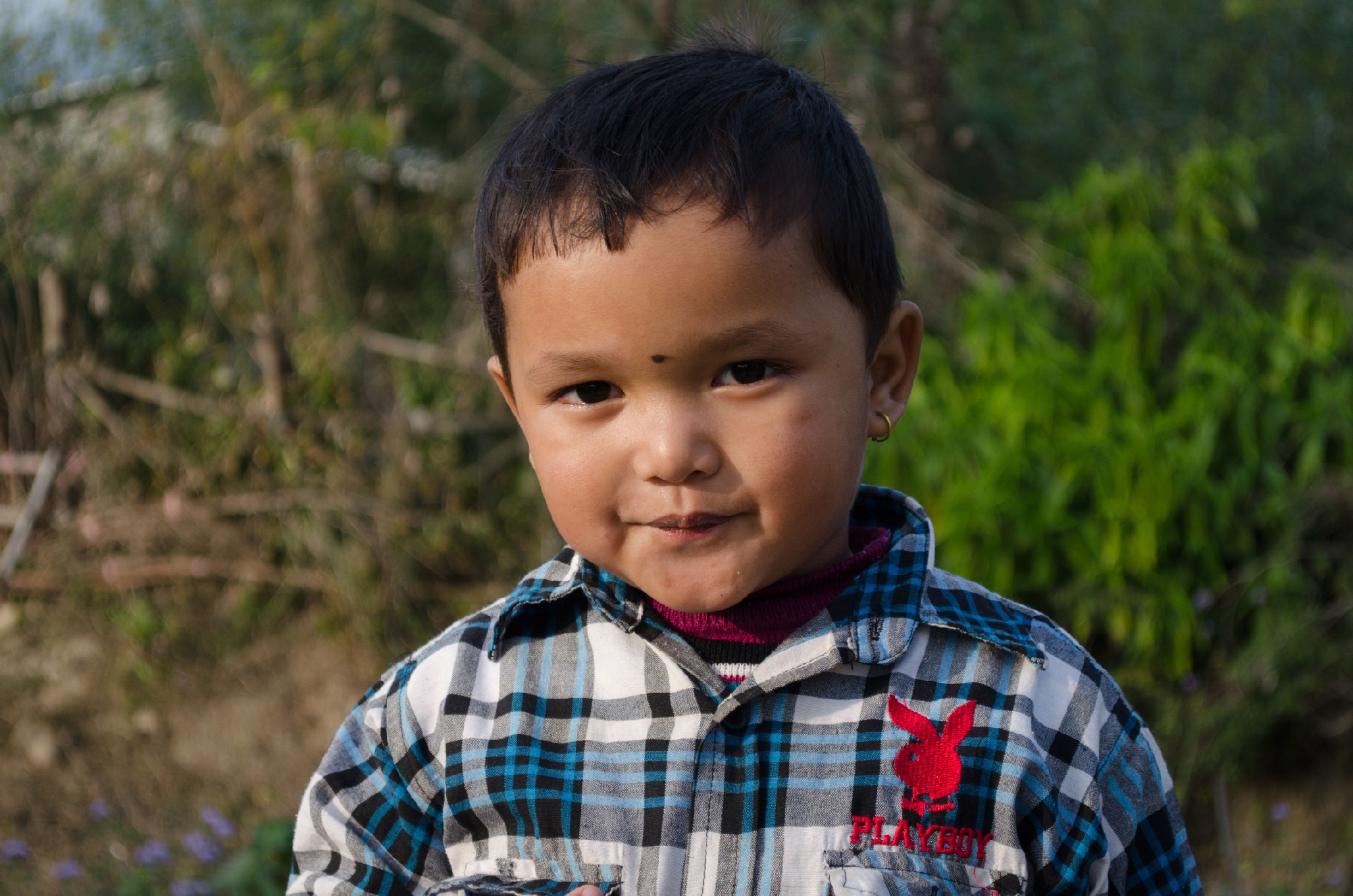
In Nepal, Sita worked with Radhika to meticulously budget the family’s remaining funds. They had just enough to fulfill the house payments, Saksham’s school fees, and utility bills, but there was little left over for food. For six years, the family had allowed people to farm their land in exchange for half of the crops or the money earned by selling them. The sharecroppers usually grew rice, sugar, or lentils, but with only two yields per year, the family earned about $110 each harvest, not enough to make a real difference.
Each day, Sarun grew more angry and depressed, wondering how Al Afdhal could refuse to pay its employees with impunity. Sarun’s boss held on to his passport. He felt powerless. Requesting to return home involved filling out company paperwork, and there was no guarantee they would let him go. Not that it mattered: in Nepal, he had never managed to get a job after high school, and he knew that returning likely meant perpetual unemployment. If he stayed in Qatar and tried to leave Al Afdhal for another company, his boss could get angry and deport him, or keep withholding his salary.
September came and went, still with no pay. In Lumbini, the family had gone from rationing to sheer survival. Then the rainy season started, and Sita decided something had to be done before the house sank, or was swept away into oblivion. She took out a bank loan, and was now playing a delicate chess match of family politics, going to relatives one by one and asking for money. In August, it was her younger sister, Rita, a clothing tailor; she loaned $301. In September, she asked her brother-in-law, Om, who works for Nepal Telecom and brings home a steady paycheck; he lent $604. Sita looked outside the family, and talked a local grocer into giving the family about $90 worth of groceries, which Sita promised to pay back as soon as possible.
Sarun hated that his mother was forced to take a loan from a bank. He had good reason for this: the bank demanded 15 percent interest — usury by most definitions — and Sarun thought it would be a stupid investment in the long run. But what could he do?
In conversation, Sita sensed her son’s unease. Her tone changed from assertive to gentle. “I know things are hard for you. It’s okay. Please don’t worry too much about us. We’ll get through it,” she told her son. “Just make sure you’re eating enough and staying healthy. Try to be happy. You can’t change things you have no power over, so there’s no use worrying.”
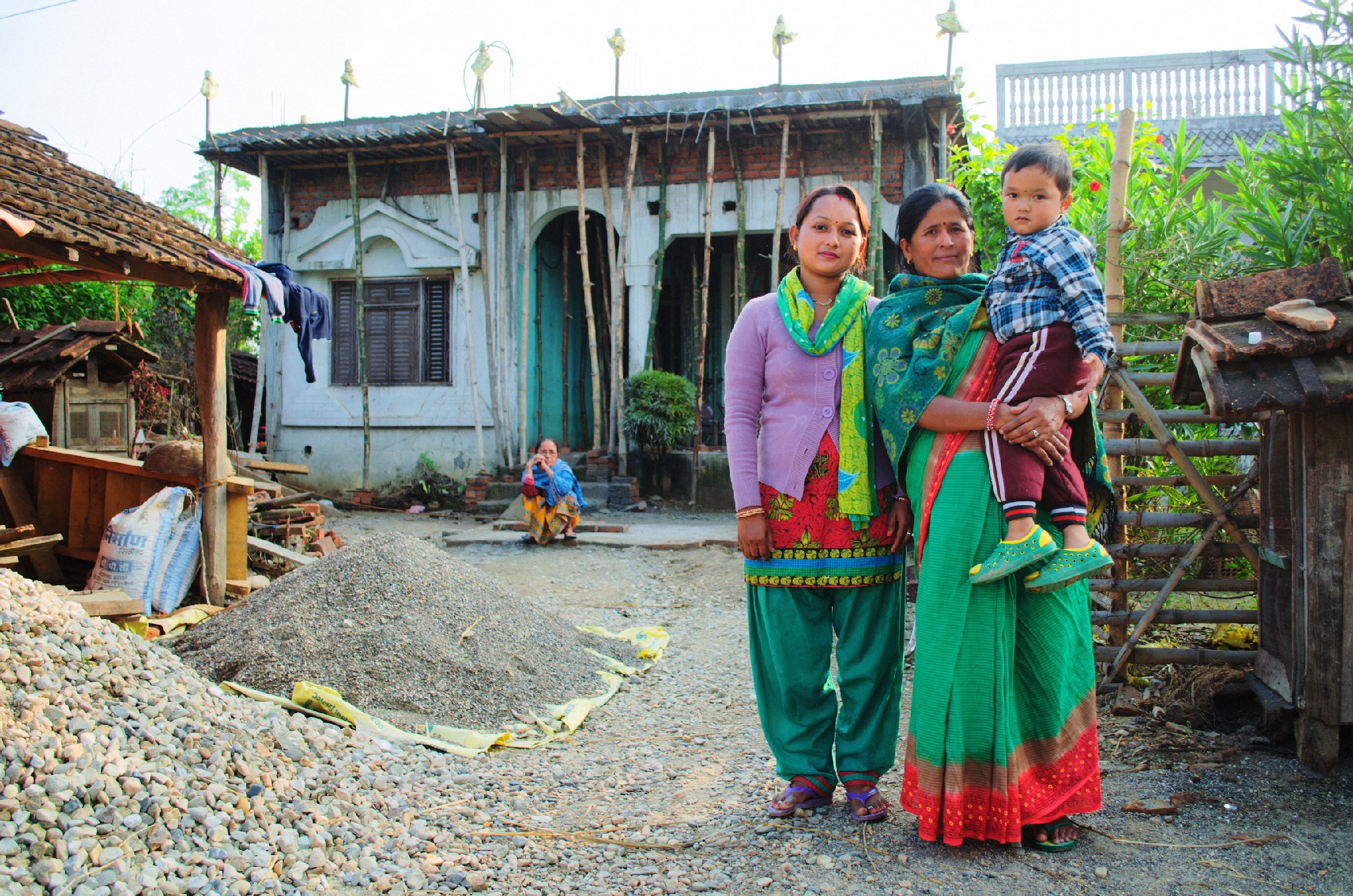
June 19, 2012
Sarun took his first trip home after two years in Qatar. After arriving at the airport in Kathmandu, he boarded a long-distance bus to his hometown of Lumbini. The bus cut westward through small villages dwarfed by the lush, green mountains that towered around them. Since his departure years earlier, smooth pavement had been laid down like carpet over the old, rutted dirt road from the capital to his hometown. Other than the new pavement, his country’s passing landscape bore an unsettling sameness, like an old friend who looks exactly the way you remember from your childhood.
It was different in Qatar. In Doha, where he drove a cab for Al Afdhal, everything seemed to be changing. Cranes sprouted from clusters of towering structures like legs from giant spiders. New shopping malls, Western restaurants, and other oases of consumption dropped from the sky like fruit from overwatered date palms. And, of course, there were the endless buses carrying South Asian construction workers to the sprawling build sites.
Since the country eased restrictions on who could acquire passports in 1991, millions of Nepalis have left the country to work abroad. According to the Nepal Institute of Development Studies, more than 2.2 million Nepalis, almost 10 percent of the population, now lives and works outside the country. The remittance pay they send home constitutes one-fourth of Nepal’s gross domestic product. Thanks in part to this injection of international revenue, Nepal is now growing at an annual rate of almost 4 percent. Over the past two decades, the percentage of Nepal’s population that lives on less than $1.25 a day has dropped from 68 percent to just under 25 percent, according to data from the United Nations.
On the bus ride home, Sarun thought long and hard, reassuring himself that the benefits of his migration outweighed the tearing apart of his family. Much had happened since he left home. His wife had given birth to a boy she named Saksham. He was now about 20 months old. Sarun was elated but apprehensive to meet him, and his heart pounded faster as the bus trudged along. He feared a future where his son would have to leave his own family to work overseas, returning to meet his child long after it was born. As the bus approached a stop close to his home, the reverie ended. He’d be arriving soon.
Along the paved road, Sarun occasionally saw private taxis carrying East Asian tourists. According to Buddhist tradition, Lumbini is the birthplace of Siddhartha Gautama, born to Queen Maya Devi in 623 BCE. Gautama would go on to travel much of the Indian subcontinent on foot and achieve enlightenment sometime around 543 BCE. The Buddha’s message was simple: love, kindness, and a rejection of worldly materialism and the greed and suffering it begets.
Sarun later told me that when the bus stopped, he was the only one to get off. Waiting for him at the stop were Sita, an aunt, one of his sisters-in-law, and his son. His wife, Radhika, had not come.
Sarun’s jet-black hair had been about two inches long when he left home; it fell over his forehead like tattered curtains and often stuck out on top like a stubborn patch of grass. As he stepped off the bus, Sarun wore a tight crew-cut, spiked up in front and greased from traveling. His squinty brown eyes seemed sharper now, but his plump, boyish cheeks were the same, as were his wide nose and a mouth that rarely parted into a complete smile (only a subtle smirk hinted at his joy). His build was the same, medium height and stocky, with large muscular arms, legs like oak beams, and the suggestion of a paunch.
Tears streamed down Sita’s face as soon as she hugged him. She apologized and said she couldn’t help it. For most of Sarun’s childhood, she had raised him as a single mother; early on, his father had left to work in India, where he died when Sarun was 14 years old. “You’re back,” she marveled. Her body stiffened again, tall and firm and strong, gripping her son with new rigor. She knew he would leave again soon and that she would have to let him go. But right now, for a brief moment, she could hold him in her arms and soak his neck with tears.
“It’s okay, Mom. I’m here now. You don’t have to cry,” Sarun said. After a few seconds, he released his embrace, and his mother relented slowly and wiped her eyes. He greeted his aunt and sister-in-law, then moved to his son, who stood by the aunt, utterly confused. Sarun reached out to hug Saksham, but the boy ducked and ran to Sita, hugging her leg and hiding his face from his father.
Sarun squatted there on his heels and looked at the earth. It was naïve, he supposed, to think that Saksham would run into his arms. He was a stranger.
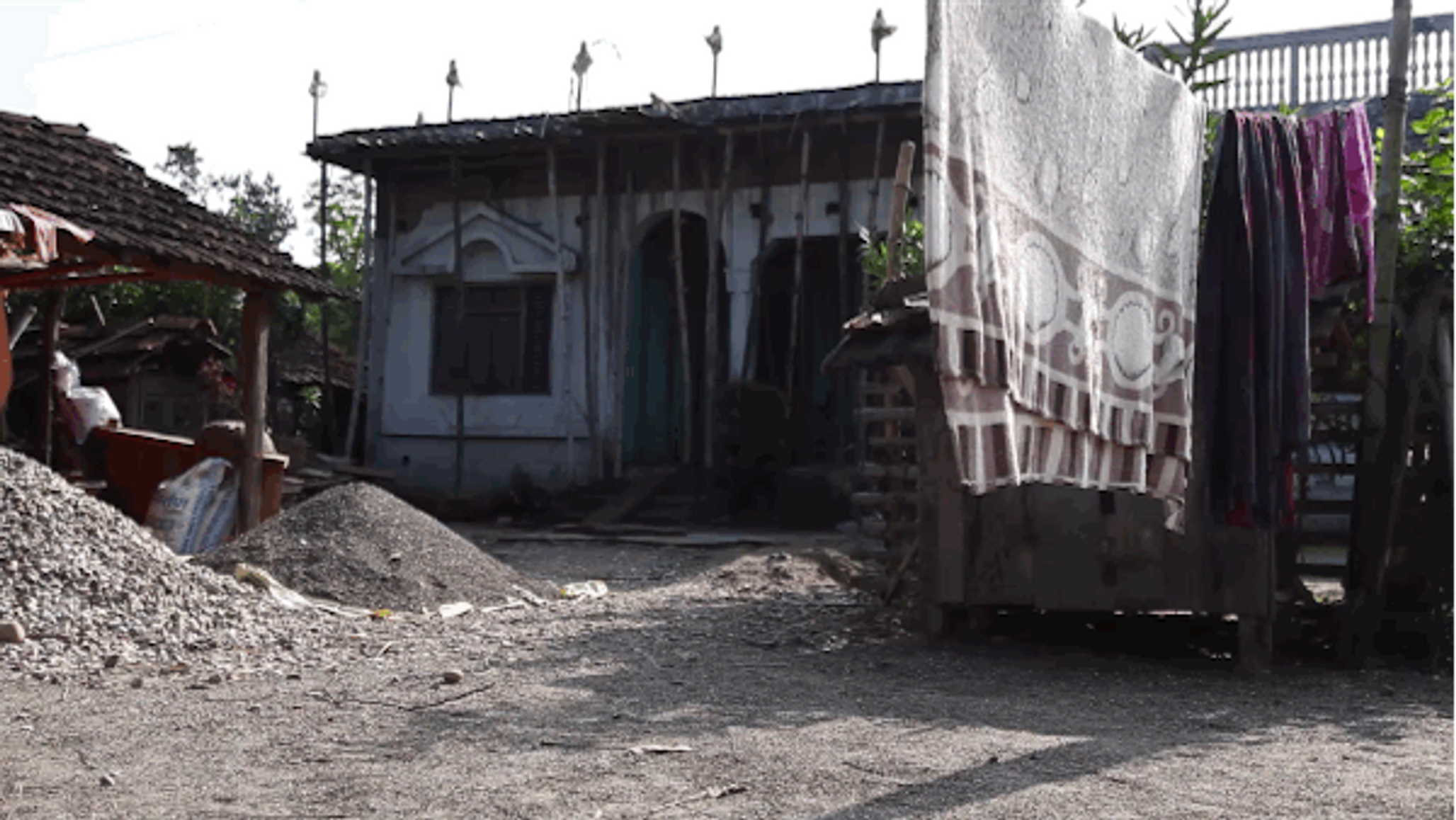
January 19, 2015
At five AM, Sarun woke to an alarm on his phone. Rolling out of bed, he stood and turned to the wall, putting his hands together. He bowed in prostration.
“Jay shri ganeshaye namah om aye,” he whispered, reciting a Sanskrit prayer to the Hindu god Ganesh, known to remove obstacles from those in distress. Sarun walked to the bathroom and showered.
His housing complex in Qatar is a squat, cream-color, one-story building far west of Doha’s main city-center, just outside of the industrial area. Thousands of workers live in this district, often in crumbling buildings crawling with insects and lacking hot water or air conditioning. Sarun was luckier than many. Though space was cramped for the twenty Al Afdhal employees who lived there, and bedbugs were rampant, the air conditioning worked in the summers, and the showers ran hot in the winters. Winter meant that the weather was 50 or 60 degrees Fahrenheit; people could actually walk around outside without risking heat stroke. Sarun ate an egg sandwich for breakfast and hurried out the door. He had to be on the road by six o’clock.
Sarun’s first stop was the Ayana Golden Coast Hotel, several miles eastward from his housing complex into the main city-center. The hotel sits near Doha’s Corniche, a road that hugs the coastline, overlooking the business district and its glittering skyscrapers. The structures have drawn criticism from human rights activists and Islamic scholars — from the activists for the untold numbers of migrant laborers who have worked to build the towers, and from scholars who point out a Hadith in which Muhammad said that the end of time will be near “when the shepherds of black camels start boasting and competing with others in the construction of higher buildings.”
Three blocks away from the Ayana Golden Coast Hotel and Sarun’s first customer of the day is the site of what will be the National Museum of Qatar. Slated to open in 2016, the museum will include guided tours by mobile devices, oral histories compiled from interviews with Qatar’s elder generation, and 3-D digital projections of traditional dhow boats. The refurbished palace of Shaykh Abdullah Bin Jassim Al Thani, Qatar’s second ruler, who reigned in the early twentieth century, will lie at the heart of the museum. At a time when light-speed economic development has thrown the Qataris into a state of cultural vertigo and generational disconnect, the museum is a $434 million attempt to connect the past to the present. Its exterior is said to be inspired by a desert rose, but it looks more like a cluster of crash-landed UFOs that miraculously missed the shaykh’s palace but somehow melted together in the heat of the sweltering sun.
After dropping off a customer, Sarun drove to the Four Seasons Hotel. Located on the cuff of Qatar’s financial district, the hotel’s rooms overlook the Arabian Gulf and cost more for a single night than Sarun earns in a month. From there, he drove several visiting doctors to Weill Cornell Medical College in Qatar. The university is one of six American institutions hosted by the Qatar Foundation, a government-funded research conglomerate.
From the same location, Sarun picked up several medical students, driving them to West Bay Health Center toward the city’s northwest corner. His phone rang — it was his mother. He asked the students in the back seat if they minded if he used the phone. They said no, and Sarun wrapped his headset around his ears and answered.
They talked briefly. Hi, how are you? I’m okay here. Don’t worry about me. How’s everyone there? Despite the brevity of the conversation, the situation was far from normal. Sita had developed pain in her shoulders that had grown so bad that she traveled two hours away to the city of Butwal to receive medical treatment. She stayed with her mother, brother, sister-in-law, and two nieces who lived in the city. The treatment still cost about $100, no small sum for the family. On top of that, Sita had taken out a $4,069 loan with a $50 monthly interest rate to pay for the labor needed to reconstruct the roof. She would need to find another $1,300 to pay for building supplies.
Several weeks ago, construction started, and local handymen planted bamboo rods around and within the house so that they reached the ceiling and prevented the home from collapsing. One bedroom and the kitchen were blocked off, so Radhika, Sita, and Saksham had to make do with one bedroom that would double as a kitchen.
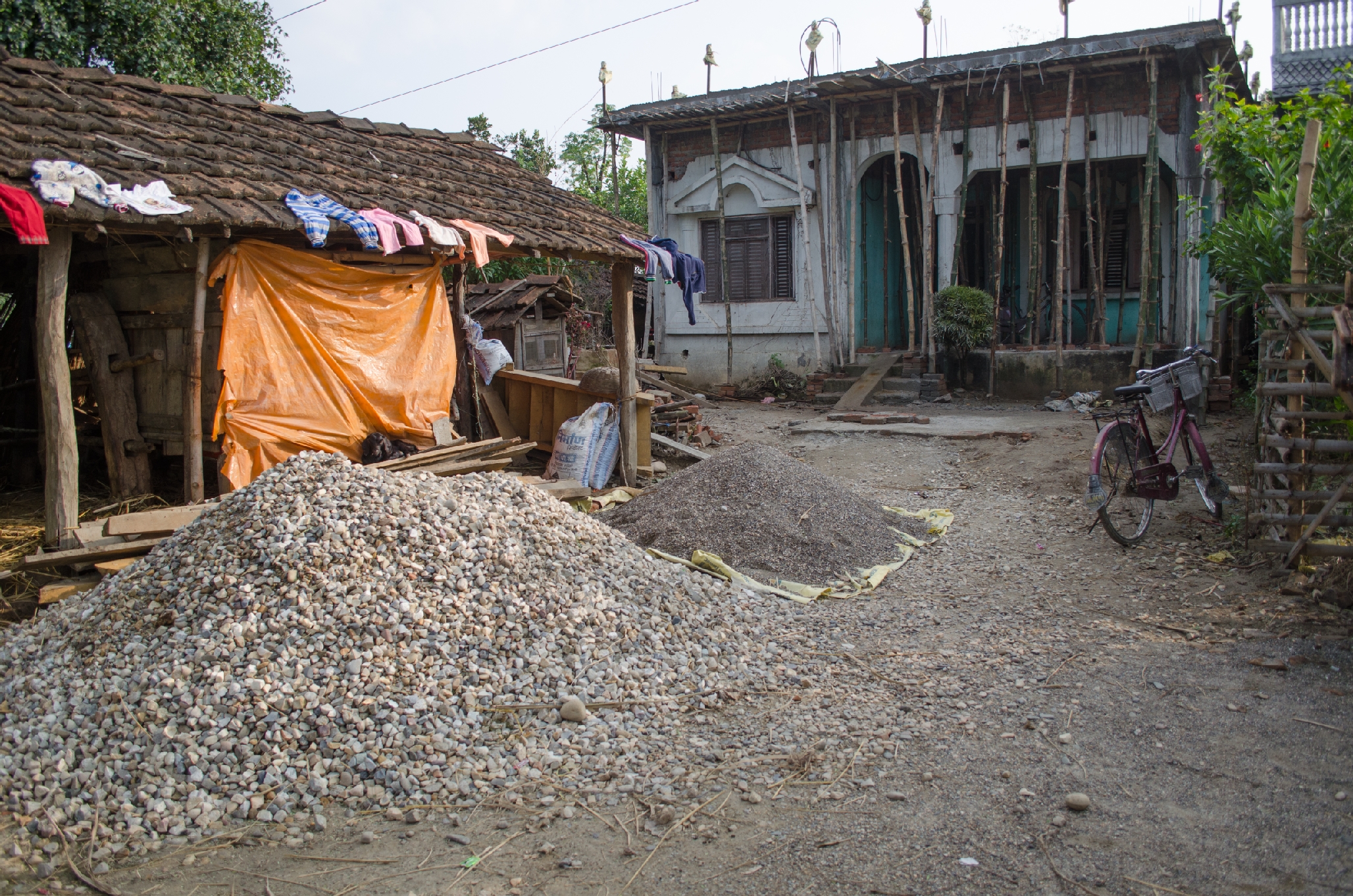
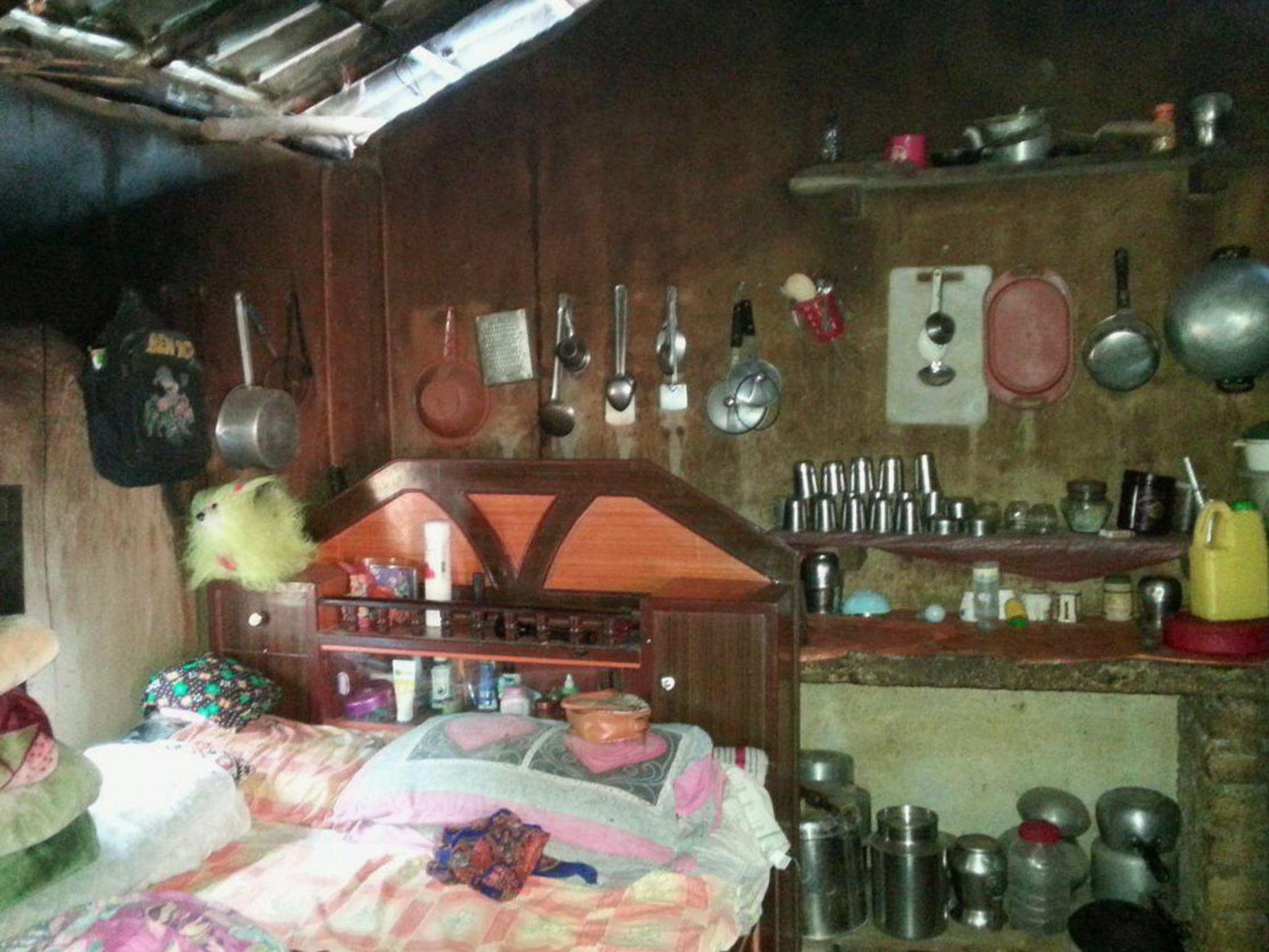
Sarun hung up the phone as he pulled into the clinic. The students thanked him and departed. They had booked him for a ride to the clinic, then back to campus, and Sarun had about twenty minutes to wait until they returned. For several minutes, he zoned out to Hindi music. Then he dialed his wife and put his headset back on.
“Hello,” Radhika answered.
“Hi how are you?” Sarun asked. “I have some free time so I thought I’d call.”
“Thanks,” she said. “But I’m sorry. I’m busy at the moment. Can you call back later?”
“Okay. No problem.”
He took off his black headset and stared at it for a while. After living away from his family for four and a half years, and spending much of that time gazing out at black pavement, he no longer thought of the world in sentimental terms. More clearly than before, he understood the reality of his situation, that half a decade of his youth had been spent driving a cab in a country more than 2,000 miles from his home. He had a son who barely knew him, a mother in declining health, a wife who slept without him, a family who depended on his income to survive. “Spending your youth here and going home an old man is no life,” he told me later. He said he regretted getting married young, that he did not process the fact that by doing so, three lives would soon be financially dependent on him. He did not think ahead and see that farming his property would never earn enough money to pay the bills and put food on the table, and that he would be marooned indefinitely.
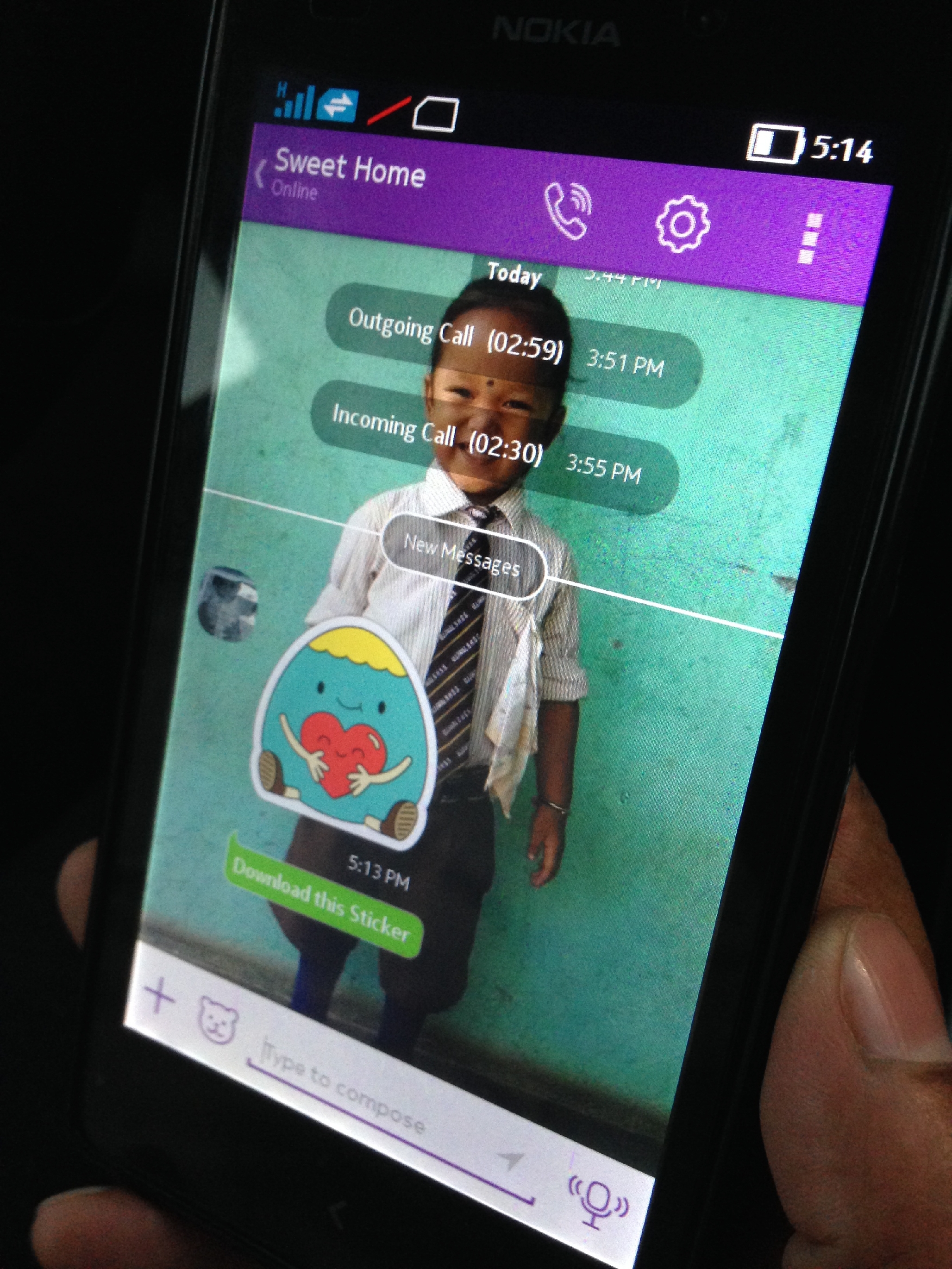
“I wish I would have lived for myself for a while. I could have travelled and worked somewhere I wanted,” he said. “Now, when I go home, my family is happy to see me at first. But after about three months, they get stressed because I’m not earning a salary, and they want me to go back to Qatar.” Sarun plans to return to Nepal in 2017. “I will go for about five months. For two or three months, I will visit my family. Then I will travel to different cities in Nepal and see what kinds of work make the most money. Then I will return to Qatar to work for a year or two. Then I’ll go back to Nepal forever.” By that time, he will be 27 or 28 years old.
“At first, I was so happy to go back home, and so sad to leave. The first two times I left home, I cried a lot. But lately, I don’t feel as much,” Sarun said. “The last time I visited home from Qatar, I didn’t cry when I had to leave.”
After dropping the students back to Cornell, it was around eleven AM, and he stopped for lunch. The rest of the day was slow, with only a few more customers. At four, his shift was over, and he drove back to Al Afdhal’s office. Salary-wise, things had improved. After missing payments for July, August and September, Al Afdhal had increased Sarun’s base salary to $493 and paid him $522 on October 25, accounting for 20 hours of overtime, which earned him $1.37 extra per hour. On November 17, he was paid $577. On December 17, the company began deducting a $14 fee for the phone service they provide Sarun (which is not what he uses to call his family), and paid him $563.
In the past few months, Sita had been able able to pay off much of the loans she had acquired during the summer months when Sarun received nothing, but the roof restoration added a new burden of debt to begin repaying. During their phone conversations that week, she told Sarun that she needed roughly $1,500 as soon as possible to pay monthly bills and buy the roofing materials. Sarun thought that was impossible, but said he’d do his best to send that amount by the end of the month.
Today, when Sarun went into the office and asked for his salary, he also asked for a $274 advance to help his mother with the housing expenses. His boss consented and gave him $871. Sarun had saved up about $137 in tips, and was able to borrow another $55 from a friend. When he added it to the money his boss gave him, he had enough to send $1,044, more than 100,000 Nepali rupees. He took the money to Aldar Exchange in Doha’s Gharafa district near where he lives. Here, he gave it to the teller along with the name of his uncle Krishna, with whom Sita was staying in Butwal. Krishna had volunteered to act as courier and spare Sita the trip to the bank.
Sarun now had only $20 left for food to last the month; if he was lucky, he would earn some tips that would get him by. He slipped the cash into the money-pouch in his pocket as the teller printed a receipt. Before going to the exchange, Sarun had saved up $135. It was the first time he had managed to save any money since he began working abroad. He had hoped it would be enough to support his job search around Nepal during the five months he planned to spend there in 2017. But he had also planned on using it for a bit of recreation. An Indian horror movie he wanted to see was playing at a mall near his housing unit. He and several of his friends at Al Afdhal planned to go the next time they got a day off. Movies were expensive in Doha, usually at least $11.
Whenever drivers complained of boredom, their boss chided them. “You are not supposed to have fun here. You are only supposed to work and send money to your families. When you go home to visit after a few years, then you can think about having fun.”
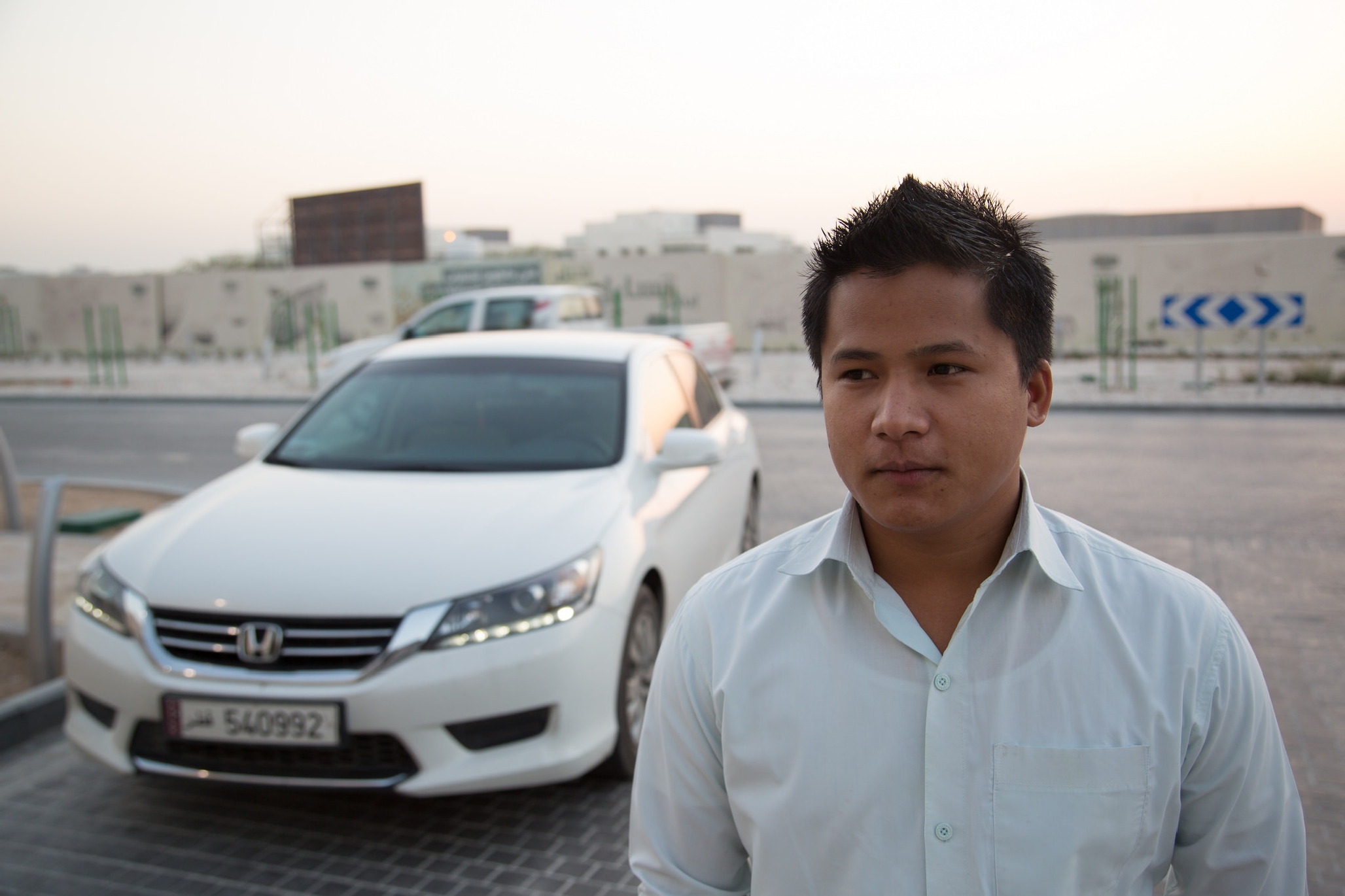
Sarun knew he might never end up going to the movie with his friends. He knew it was a bad idea anyhow, since his company could stop paying him at any time, and he needed every penny he could muster. But he liked having something to look forward to, something to plan for other than the endless destinations of customers. He wanted to escape, ever so briefly, from the road and its tendency to suck you down a drain of emotionally exhausting thoughts.
At Aldar Exchange, the teller handed Sarun a receipt for the $1,044 transfer. Sarun thanked him and walked away.
Getting into the car, he looked at his phone and saw he had not missed any calls from Sita or Radhika. They’ll probably call soon, he thought to himself, maybe in a few hours before they go to sleep. They’ll be happy to know the money was sent. He turned his key, backed the car out of its parking spot, and drove off.
* * *
J. Zach Hollo has worked as a reporter for Doha News and Al Bawaba. Zach’s work has appeared in Global Post and the Huffington Post, among other outlets. Follow him on Wordpress or on Twitter at @JZachHollo.
Videos by J. Zach Hollo and Xiran Liu.
